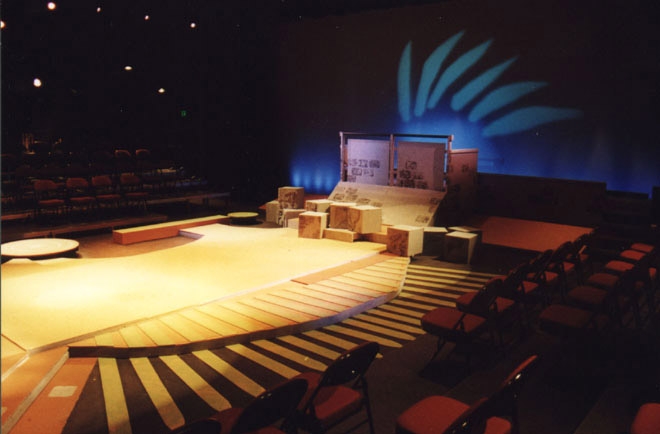Aspiring playwrights will find themselves face-to-face with audience feedback once again during Theatre Kalamazoo’s 7th Annual New Play Festival.
While the plays offer entertainment value for audience members, the real intention of the festival is to provide constructive criticism for the playwrights about their work. Each of the plays, either one-act or 10 minutes in length, are presented as staged readings, meaning the actors are reading on stage from scripts they hold in their hands.
Held at the Judy K. Jolliffe Theatre (formerly Epic Theatre), the New Play Festival runs for two days, Feb. 3-4.
Kevin Dodd, managing producer for Theatre Kalamazoo, said the ability to have a play critiqued before it’s fully developed enables the writer to know what works and what doesn’t before getting too far in. Dodd said audience members are invited and encouraged to provide feedback at the conclusion of each performance.
“The focus of the festival is really on the work of the writer and the rest of us are there to help with the process,” Dodd said. “This is really helping to create a more fertile environment for writers in the area.”
Critiques also are offered up by established playwrights who participate in workshops during the festival. For the past two years, festival organizers have been able to work with playwrights who are brought in as part of Western Michigan University’s Frostic Reading Series.
Dodd said Theatre Kalamazoo has tied that speaker series to its festival, so a reading from a nationally-known playwright can serve as the kickoff for the New Play Festival. This year’s guest playwright is Emilio Rodriguez, a young, up-and-coming voice from Detroit who will read from his play Blood Moon Baby.
The eight plays that will debut during this year’s festival were selected by a panel of local theater experts led by Dodd and Steve Pfeffer, professor of playwriting at Western Michigan University. The number of plays submitted has ranged from 20 to 50 since the start of the festival.
“We’re pretty good at determining what works or what could work if it had a little bit of development,” Dodd said. “Sometimes you don’t know until the actors read it, which enables you to see what the weaker parts are or what might be improved.”
Once the plays are selected, directors are assigned, actors audition and each play is rehearsed at one of Theatre Kalamazoo’s 11 member theaters.
“This is a really great opportunity for actors who are thinking about trying out their acting talents but don’t have a lot of time or experience, because they don’t have to memorize the lines,” Dodd said.
Emily Duguay, director of Theatre Arts Management at WMU, said the local acting community looks forward to participating in the festival.
“For a community like Kalamazoo to celebrate new play development is extraordinary,” Duguay said. “It’s very unique to have an annual opportunity to submit work for consideration in this way. It speaks again to the enthusiasm in this community for the arts.”
Plays that have debuted at the local festival have gone on to be included in other festivals, including a play written by Tucker Rafferty, which took top honors in the Michigan Playwrights Festival.
Dodd, a graduate of WMU’s Theatre program, said he worked extensively with playwrights on new plays and festivals during the few years he spent in New York.
“This kind of festival is something you see happening a lot in larger cities,” Dodd said. “It’s important to have those opportunities here.”
Prior to the creation of the New Play Festival, theaters in Kalamazoo would hold new play readings at their own venues. Duguay said operating the festival as part of Theatre Kalamazoo enabled organizers to make it bigger and better.
The festival is underwritten by the Irving S. Gilmore Foundation, which also provides financial support to Theatre Kalamazoo.
Duguay said the idea for Theatre Kalamazoo came about more than 10 years ago as a way to make sure that area theaters weren’t stepping on each others’ toes.
“Our season planning happens at about the same time every year,” Duguay said. “It made sense to sit around and discuss shows so we don’t all do the same shows.”
When two venues have the same show in their season lineup, Duguay said negotiations take place to reach a compromise. She said this happens each year.
In addition to meeting to discuss show lineups, representatives meet monthly to discuss ways to pool their resources and cover the cost of necessities, such as advertising or administrative work. Duguay said the larger organizations provide mentoring and other assistance to Theatre Kalamazoo’s smaller members, such as Fancy Pants and Queer Theatre Kalamazoo, who don’t have full-time staff or any administrative support.
Each of the theaters brings different experiences to its audiences and they don’t view each other as competition, Duguay said, adding that Kalamazoo has created a culture that allows these performance venues to all thrive together.
“Our philosophy is that if we raise awareness about the art form and celebrate all of the many ways in which it’s done, it only brings everyone up,” she said. “Everyone has found a place for themselves in this community.”





